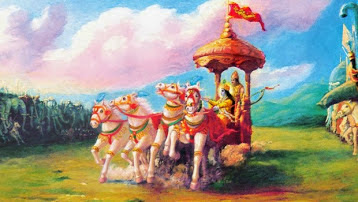Gita : Ch-7. Slo-28.
Srimad Bhagavad-Gita :
Chapter-7. ( Jnana-vijnana-yogam )
Slokam-28. ( Persons who have acted piously in previous lives and in this life, whose sinful actions are completely eradicated and who are freed from the duality of delusion, engage themselves in My service with determination.)
yesham tvantagatam papam jananam punyakarmanam,
te dvandvamohanirmuktah bhajante mam drddhavratah.
tu = but;
punyakarmanam = due to punya ( pious ) karmamanam ( past actions ), the result;
yesham jananam = whose of the persons;
papam antagatam = sin completely eradicated;
te dvandvamohanirmuktah = they (are ) free from the delusion duality ( joy and sorrow );
drddhavratah mam bhajante = with determination worship Me.
Those eligible for elevation to the transcendental position are mentioned in this slokam. For those who are sinful, atheistic, foolish and deceitful, it is very difficult to transcend the duality of desire and hate.
Only those who have passed their lives in practicing the regulative principles of religion, who have acted piously and have conquered sinful reactions can accept devotional service and gradually rise to the pure knowledge of the Supreme Personality of Godhead.
Then, gradually, they can meditate in trance on the Supreme Personality of Godhead. That is the process of being situated on the spiritual platform. This elevation is possible in Krishna consciousness in the association of pure devotees who can deliver one from delusion.
It is stated in the Srimad-Bhagavatham that if one actually wants to be liberated he must render service to the devotees; but one who associates with materialistic people is on the path leading to the darkest region of existence.
All the devotees of the Lord traverse this earth just to recover the conditioned souls from their delusion. The impersonalists do not know that forgetting their constitutional position as subordinate to the Supreme Lord is the greatest violation of God's law.
Unless one is reinstated in his own constitutional position, it is not possible to understand the Supreme Personality or to be fully engaged in His transcendental loving service with determination.
The question may be raised that if embodied beings have been deluded from time immemorial since conception in the gross body why is it that some people are still seen exclusively worshipping the Supreme Lord? To this Lord Krishna answers with the words punya-karmanam meaning performers of virtuous deeds.
Such persons having association of the Lord Krishna's pure devotee and under His guidance are able to free themselves from all sins and thus in the next life are born directly into a spiritual family by such merits. The accumulated sins of previous lives which veil the light of consciousness have been dissolved and all erroneous knowledge along with it, by performance of meritorious spiritual activities for many lifetimes.
All delusion in the form of reacting in attraction and aversion to the dualities such happiness and distress, pleasure and pain, success and failure, etc have been neutralised and hence one qualifies for knowledge of the ultimate truth with firm resolve to worship the Supreme Lord Krishna, the supreme controller, omnipotent and omniscient, the cause of all causes, the ultimate bestower of all benedictions and just rewards for all actions and who is an ocean of love for His devotees.
Humans possessing virtue whose sins have dissolved away due to exclusively performing righteous actions in words, thoughts and deeds have effectively terminated sins stemming from an immemorial past due to the impulses of dualities in the form of attraction and aversion which obstructed them from being spiritually aware and God conscious.
The termination of such sins by virtue of highly meritorious activities benefiting all creation is only acquired after many numerous lives.
Determined by the various degrees in quality of merit derived from purely spiritual activities or spiritual activities mixed with philanthropic activities or philanthropic activities mixed with self interest activities, etc. humans are given the opportunity to take shelter of the Supreme Lord on different levels in varying degrees and sanctioned to be relieved from the beguiling bewitchment of maya or illusory impressions superimposed upon the mind.
Then at that time they realising Lord Krishna's supreme position they make a firm resolve to worship Him exclusively seeking either: aisvarya arthi or great fortune, opulence and power.
Applies to the atharthi in slokam 16. kaivaly-arthi or self-realisation over death. Applies to the jijnasur in slokam 16 . moksa-arthi the Supreme Lord Himself as the only goal. Applies to the jnani in slokam 16.
Enumeration and will now be giefly given regarding the qualifications which the above stated three categories of the Supreme Lords own votaries have to acquire along with requisite knowledge they have to cultivate and obtain.
The question might arise how is it that some people are seen to exclusively worship the Supreme Lord Krishna? This is being answered with anta-gatam papam meaning those whose sins have been completely eradicated.
This is due to having taken shelter of a pure devotee of Lord Krishna and becoming habituated to perform meritorious activities in the mode of pure goodness without desire for rewards.
Once the reactions to past sinful activities are terminated the obstruction to realisation is neutralised and one is freed from the delusion arising from attraction and aversion to the dualities such as pleasure and pain, joy and grief, success and failure, etc.
At this time one becomes qualified and is able to become devoted to Lord Krishna with determination, worshipping Him exclusively.
To be continued ...





Comments
Post a Comment